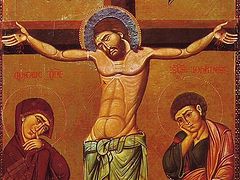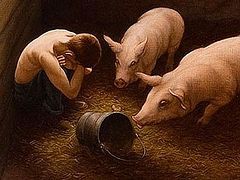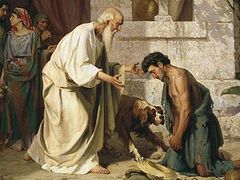Today, dear friends, the Lord gave us this beautiful image of repentance in the holy Gospel. This is the image we should keep before us as we approach Great Lent. It is for this reason that the holy fathers appointed that this particular Gospel reading from Luke—the Parable of the Prodigal Son—should be read in the churches during the holy liturgy this day, three Sundays before the beginning of the Lenten fast.
And this beautiful image, as I said, is painted for us. It is the image of a Father (God the Father) and He has two sons—these sons represent the righteous and the rest of us, us sinners. We are represented in the second son. And the second son says to the Father: “Give me the portion of my inheritance.” And what is the portion of my inheritance? These are the gifts which the Father bequeathed to each and every one of us in the holy mysteries… the holy mystery of Baptism, the holy mystery of Chrismation. By these two mysteries, we are initiated into the Body of Christ, we are clothed with Christ and partake of his death and resurrection, the soul is regenerated, and the Holy Spirit generously bequeathes an inheritance, the talents, the gifts. Gifts like love and charity and kindness and forbearance—just as they are described by the holy Apostle Paul.
We are also entrusted with a particular inclination, a particular talent or set of talents with which we must work and which we must multiply. And we also receive gifts in our participation at the holy Eucharist, and in the mystery of marriage for those of us who are married. We must “perfect the marriage bond” by the holy sacraments. And in the mystery of the holy priesthood, another extremely important gift is given: the gift to shepherd the flock, the gift to protect the parakatathiki—the inheritance—which is the holy mysteries, especially Holy Communion, the gift to bestow eternal life through Christ to the world. For monastics also gifts are given, the gift of prayer, contemplation, and obedience. Gifts are given to everyone in the church according to their own particular abilities and needs.
What do we often find ourselves doing? We find ourselves as the second son. We go off into various far-away countries, on various tangents, down various rabbit holes. We squander the gifts of the Father. For one it may be drinking, for another sexual immorality, for yet another envy or pride or lust of power or covetousness or avarice. Another perhaps might enjoy causing strife between family and friends. Various people squander their inheritance on various things. One thing is necessary for each one of us: We must reach a point in our lives, where we arise from that desolate land of iniquity, that far off country… We must arise and say: “My life and my condition is so impoverished in comparison with what I had when I was with the Father. What should I do? I must rise from that place, I must turn back, I must at least have the thought sparking within me. I must say to myself as did the Prodigal Son: I will arise, and I will go into my Father and I will say, Father I have sinned before heaven and before Thee…”
There is a certain majesty in these words. The act of knowing yourself—self recognition—is one of the most admiral qualities in a person and was extolled as the chief among virtues by the ancients. What do we see? As soon as we’ve reached this disposition the Father sends us his love and grace. He runs towards us. He accepts us—not as a hired hand—but as a genuine child. We return to the condition we were in before we departed from his Grace.
This Sunday stands between two Sundays: between the previous Sunday, the Sunday of the Publican and Pharisee and next Sunday, the Sunday of the Last Judgement. The Sunday of the Publican and Pharisee and this Sunday are somehow connected. The Pharisee and the first Son of the Father have some commonalities. What did we hear the Pharisee say last Sunday? “Lord I am not like other men, I fast twice in the week, I give a tenth of all I own, I am not like this publican”. And the first son in today’s Gospel: “Father, I have been with you at all times. I have suffered with you. While this your son squandered your inheritance among publicans and harlots.” We heard last Sunday in the person of the Publican, “God be merciful to me a sinner.” And today, “Father, I have sinned before heaven and before Thee!” The holy Church warns us to avoid the examples of the Pharisee and the first son. The keeping of the commandments and fasting is righteous, but doing so without the proper disposition from a merciful and contrite heart ensures our efforts are empty ritualistic vanity.
We need to be conscious of the fact that the Lord values humility and a pure heart. This is the sacrifice which the Lord requires. The sacrifice of the heart. This occurs when the person is re- oriented towards the Kingdom. We must be genuine with ourselves and with others. We must never forget that in our past life we committed a myriad of sins. The first son had many gifts from the Father but not the gift of mercy. We must pray that during the somber days of the Lenten fast this gift is given to us. When we listen and internalize the holy Gospel and we live by it, slowly- slowly we will see that our interior life will change in increments.
It’s interesting to see that next Sunday, the merciful Father will become Judge of the World. He will separate the sheep. Some for life and others for perdition. Let us keep this image in mind. Let us ask ourselves: “How is it that today he welcomes the Prodigal Son but next week He will separate some sheep for life and others for perdition?” We must consider this question. God’s mercy is with us in this life... until we die. He’s waiting for us. After this point we enter His eternal presence and meet Him as judge, and we present Him with our lives and according to the sum content of our life so will He judge us. And wherever He assigns us, it will be a righteous and merciful judgement—a merciful judgement for us as our new abode will be in keeping with our own interior wishes and dispositions.
In conclusion, we must remember the axiom, “once an addict always an addict.” And here we could replace a word and say, once a sinner always a sinner. We seem to repeatedly flow from one pattern into the other. These are the passions—they nag at us, they work within us, they pull us in a certain direction; and we must not think that repentance is a magical affair. Of course, the Father accepts us into the former glory, but does this preclude our return to that far off country of sin and death? Does that mean that we, once again, will not be enslaved to the citizens (the sins) of that country? The holy Fathers were extremely conscious of this fact, and this is why the Christian’s battle against sin is a lifelong affair. Passions are diseases and they take, often, a lifetime to heal. We must keep the image of the merciful Father but it is important to be realistic—we might, suddenly, leave the Father’s mansions and tumble down sin’s highway rather quickly. This is why the ascetics were vigilant until the hour of death.
The Father is always willing to accept us, His sinful children, in whatever condition we find ourselves in. He runs towards us at the first inclination of the heart to holiness. Our life has a limit and is given to us for repentance. These pre-Lenten days are a time not only for meat eating (this week) and cheese eating (next week) in order to condition ourselves to the dietary spirit of the Lenten days, nor are these days a time for dances and parties... we must condition ourselves in a deeper manner, a more profound manner, an interior manner within the heart to the spirit of the Lenten Days. May the Father give us all the grace and mercy to reorient our lives to the heavenly kingdom!




